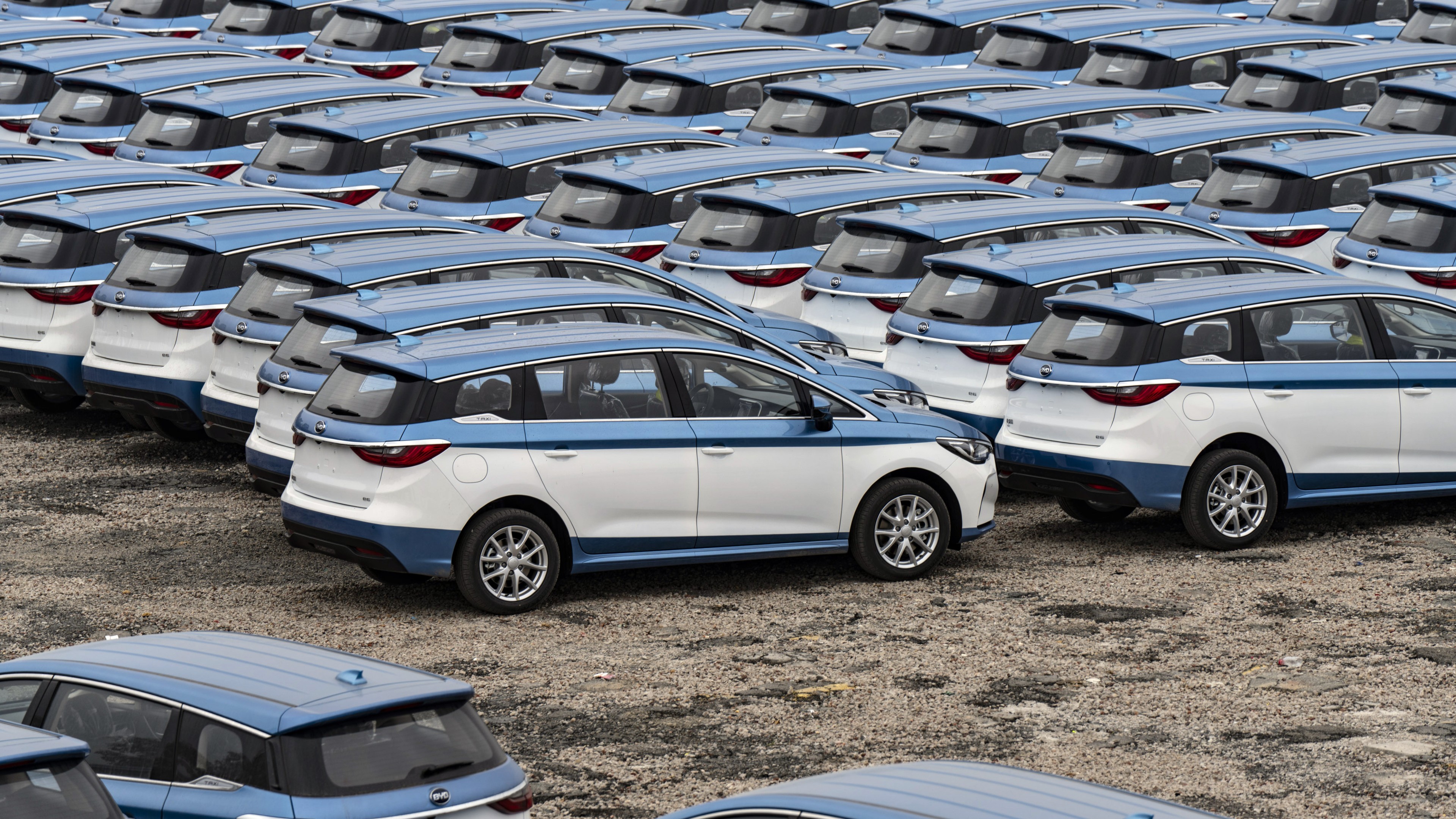What Elon Musk has to fear from China's 'Tesla killer'
BYD is now the world's biggest seller of electric vehicles


A free daily email with the biggest news stories of the day – and the best features from TheWeek.com
You are now subscribed
Your newsletter sign-up was successful
They're calling it the "Tesla killer."
A Chinese company, BYD, last year overtook Tesla as the world's leading seller of fully electric cars — and is now poised to grow even more, The New York Times said, "building assembly lines in Brazil, Hungary, Thailand and Uzbekistan" and expanding exports to Europe. Just a few years ago, BYD was merely a battery manufacturer. Now it's an automotive powerhouse. And that's gotten the attention of Tesla CEO Elon Musk. "Frankly, I think if there are not trade barriers established," he said in January, "they will pretty much demolish most other companies in the world."
Musk didn't always see BYD as a threat, CNBC said. "Have you seen their car?" he said in 2011. "I don't think it's particularly attractive, the technology is not very strong." BYD launched its first car in 2008 — the same year that Warren Buffet's Berkshire Hathaway made a $230 million investment in the company. Buffet's cash "gave a boost to BYD's electric car ambitions." The company has also received a huge assist from "the Chinese government's huge support of the country's EV sector." BYD received $4.3 billion in state subsidies between 2015 and 2020.
The Week
Escape your echo chamber. Get the facts behind the news, plus analysis from multiple perspectives.

Sign up for The Week's Free Newsletters
From our morning news briefing to a weekly Good News Newsletter, get the best of The Week delivered directly to your inbox.
From our morning news briefing to a weekly Good News Newsletter, get the best of The Week delivered directly to your inbox.
How has BYD become so successful? The cars are cheap, Fortune said. "No one can match BYD on price. Period," said one expert. The company's cars are "not a common sight" on American roads. But that's probably just "a matter of time."
China's big head start
"The significance of the rise in the Chinese auto industry as part and parcel of the energy transition is hard to understate," Justin Worland said at Time. It's not just Tesla that is challenged. As electric vehicles become even more popular, Chinese companies like BYD will challenge the dominance of Western auto companies. "We see the Chinese as the main competitor, not GM or Toyota," Ford CEO Jim Farley said last year. And it's not just cars. Chinese companies have a head start on American companies in "a range of clean energy technologies, from solar panels to lithium-ion batteries."
One undeveloped market for BYD and other Chinese automakers: Europe. "Transportation bottlenecks have held them back," Nikkei Asia said. Established giants like Toyota have giant transport ships that can carry thousands of cars at a time to Europe, but Chinese EV makers have had to secure space on shipping lines. No longer. BYD just launched the BYD Explorer, a ship that can carry up to 5,000 EVs in a single voyage. That's a "pioneering move" that should open the continent to massive new sales.
But are the cars any good? One expert pronounced BYD's EVs as "good, rather than great," said The Guardian. Good might be good enough, though. In the U.K., analysts expect that "one in three EVs will originate from China by 2030."
A free daily email with the biggest news stories of the day – and the best features from TheWeek.com
'A real competitor in China'
BYD may face one significant obstacle to its continued growth. The Biden administration is considering tariffs and other restrictions on Chinese "smart car" imports "to address growing US concerns about data security," Fortune said. EVs, after all, "collect vast amounts of information about their drivers and surroundings." That's a big concern amid growing tensions between the U.S. and China.
But BYD brings another advantage to its competition with Tesla: Home-field advantage in the world's second-most-populous country. "We often lose sight of the fact that the Chinese economy represents 1.4 billion people," Citadel CEO Ken Griffin said at a recent conference. Watching the company overtake Tesla was "heartbreaking," Griffin said. "We've got a real competitor in China," he said. "And Elon's right, the West has to grapple with the issue."
Musk's counter-punch? A cheaper car. Tesla plans to begin production on a new lower-cost EV — code-named "Redwood" — starting in 2025, Reuters said. The entry-level vehicle is expected to be priced around $25,000, which should allow it to compete with "inexpensive EVs, such as those made by China's BYD." We'll see if that happens, though: "Tesla has a track record of missing its targets for launches and pricing."
Joel Mathis is a writer with 30 years of newspaper and online journalism experience. His work also regularly appears in National Geographic and The Kansas City Star. His awards include best online commentary at the Online News Association and (twice) at the City and Regional Magazine Association.
-
 How the FCC’s ‘equal time’ rule works
How the FCC’s ‘equal time’ rule worksIn the Spotlight The law is at the heart of the Colbert-CBS conflict
-
 What is the endgame in the DHS shutdown?
What is the endgame in the DHS shutdown?Today’s Big Question Democrats want to rein in ICE’s immigration crackdown
-
 ‘Poor time management isn’t just an inconvenience’
‘Poor time management isn’t just an inconvenience’Instant Opinion Opinion, comment and editorials of the day
-
 Elon Musk’s starry mega-merger
Elon Musk’s starry mega-mergerTalking Point SpaceX founder is promising investors a rocket trip to the future – and a sprawling conglomerate to boot
-
 Trump wants a weaker dollar, but economists aren’t so sure
Trump wants a weaker dollar, but economists aren’t so sureTalking Points A weaker dollar can make imports more expensive but also boost gold
-
 Will SpaceX, OpenAI and Anthropic make 2026 the year of mega tech listings?
Will SpaceX, OpenAI and Anthropic make 2026 the year of mega tech listings?In Depth SpaceX float may come as soon as this year, and would be the largest IPO in history
-
 Ryanair/SpaceX: could Musk really buy the airline?
Ryanair/SpaceX: could Musk really buy the airline?Talking Point Irish budget carrier has become embroiled in unlikely feud with the world’s wealthiest man
-
 Can Trump make single-family homes affordable by banning big investors?
Can Trump make single-family homes affordable by banning big investors?Talking Points Wall Street takes the blame
-
 TikTok secures deal to remain in US
TikTok secures deal to remain in USSpeed Read ByteDance will form a US version of the popular video-sharing platform
-
 How will China’s $1 trillion trade surplus change the world economy?
How will China’s $1 trillion trade surplus change the world economy?Today’s Big Question Europe may impose its own tariffs
-
 Shein in Paris: has the fashion capital surrendered its soul?
Shein in Paris: has the fashion capital surrendered its soul?Talking Point Despite France’s ‘virtuous rhetoric’, the nation is ‘renting out its soul to Chinese algorithms’
